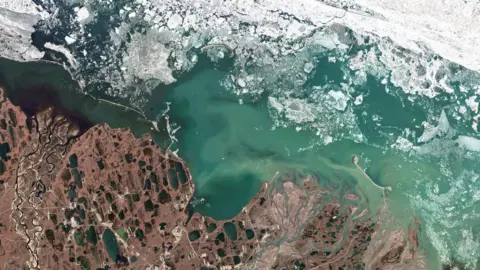Willow project: Biden curbs drilling ahead of decision on Alaska oil project
 Getty Images
Getty ImagesPresident Joe Biden has imposed limits on oil and gas drilling in 16 million acres of Alaska and the Arctic Ocean.
The announcement on Sunday came as his administration reportedly prepares to approve a major drilling project elsewhere in the region.
The $8bn (£6.6bn) Willow project - if agreed - would be one of the biggest oil projects in the country in decades.
Environmental groups and some Native residents fear the plan may have an impact on climate and damage wildlife.
Opposition has grown rapidly in the last few weeks as the #stopwillow campaign gained traction on TikTok.
President Biden is expected to make an announcement on the project on Monday.
ConocoPhillips, the company behind the project, said it would create thousands of jobs and revenue for the remote area. Alaskan politicians, trade unions and some indigenous communities have also urged for it to be approved due to its potential economic benefits.
On Sunday, the US Interior Department announced that nearly 3 million acres of the Beaufort Sea in the Arctic Ocean would be "indefinitely off limits" for oil and gas drilling.
The move ensures that important habitat for whales, seals, polar bears and other wildlife "will be protected in perpetuity from extractive development″, the White House said in a statement.
The government also said it would propose new limits to drilling in more than 13 million acres of "ecologically sensitive" land in Alaska's vast petroleum reserve.
The reserve is a 23-million acre area on Alaska's North Slope that was set aside a century ago for future oil production. It is the largest area of undisturbed public land in the US and plays host to critical species including polar bears.
"With these actions, President Biden continues to deliver on the most aggressive climate agenda in American history," the announcement said.
One environmental group said the new limits did not go far enough and criticised the proposed Willow project, which would take place within the petroleum reserve.
"Protecting one area of the Arctic so you can destroy another doesn't make sense, and it won't help the people and wildlife who will be upended by the Willow project," said Kristen Monsell, a senior lawyer at the Center for Biological Diversity.
Michaela Stith, Climate Justice Director at Native Movement, an Alaskan based social justice charity, told the BBC that some communities would take direct action if the Willow project is approved.
"We are living in a state monopolised by oil and gas," she said. "There are not many opportunities to do much else that's why you will see local support [for the proposal]. Our state has not been able to diversify our economy."
President Biden is trying to balance his goals of making the US a net zero contributor to climate change by 2050 with pressure to increase fuel supply to keep prices low.
The US Bureau of Land Management estimates that the Willow project would produce up to 278 million metric tons of CO2e over its 30-year lifetime - the equivalent of adding more than two million cars to roads in the US.
CO2e is a unit used to express the climate impact of all greenhouse gases together as if they were all emitted as carbon dioxide.
The decision on whether to approve the project will likely be one of Mr Biden's most significant climate decisions and comes as he prepares an expected bid for re-election in 2024.
Additional reporting by Esme Stallard
